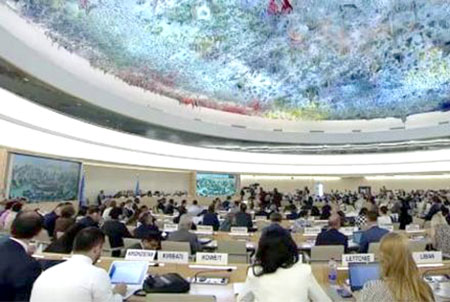The United Nations High Commissioner for Human Rights, Michelle Bachelet, said that the International Criminal Court (ICC) continues to “pursue its independent investigation of international crimes that may have been committed in Afghanistan.”
She said the investigation will be conducted based on ICC’s own framework. The 50th session of the UN Human Rights Council was held on June 13 and will last till July 8.
“We cannot forget the people of Afghanistan. The path to a prosperous and peaceful Afghanistan cannot be paved without consecutive efforts by the de facto authorities, support by the international community and meaningful participation by all parts of society in public and political life, especially women and girls,” Bachelet told the session.
Speaking at the session via Zoom, Samira Hamidi, Amnesty International’s South Asia Campaigner, expressed concerns over the continued use of “repressive measures” in Afghanistan.
“Taliban de facto authorities continued to use repressive measures with devastating consequences for people… to their right to life, freedom of expression and assembly. This has been particularly harmful to the rights of women and girls,” she said.
“Women’s rights is not only a human rights issue. It is an issue of national, regional and global security to which the world must respond and in an impactful way,” said Shaharzad Akbar, former head of Afghanistan Independent Human Rights Commission.
The envoys of Turkey, Saudi Arabia, European Union and the international community called for further humanitarian aid to Afghanistan to avert the hunger crisis in the country.
“There is still a clear dangerous starvation and a total collapse of the whole system,” the Turkish envoy said.
This comes as many human rights organizations expressed concerns over the situation of human rights in Afghanistan.
However, the Islamic Emirate has constantly denied the violation of human rights in the country. Meanwhile, participants at the UN Human Rights session expressed concerns over the situation of human rights in Afghanistan, particularly the women’s condition.
The 15th regular session of the UN was held on June 13 and will last until July 8.
On day three of the session, the participants discussed the situation of women around the globe, and voiced “deep” concerns about Afghan women’s status.
Talking to the panel, UN Secretary-General Antonio Guterres said that the “Taliban’s Government of men has resulted in nearly 20 million women and girls being silenced and erased from sight, as well as deteriorating situations” in Afghanistan.
According to a UN press release, Guterres said that the UN is unequivocal about the fundamental rights of women and girls. “That is why we need full gender parity,” he stressed — including through quotas to accelerate the inclusion of women across election monitoring, security sector reform, disarmament, demobilization and justice systems.
Stella Ronner-Grubačić, Ambassador for Gender and Diversity of the European Union, told the panel that the EU launch of the Afghan Women Leaders Forum in March is providing a platform for Afghan women from diverse backgrounds to contribute to the political dialogue of the European Union and the wider international community on the future of that country.
“In Afghanistan, since the Taliban’s violent takeover in August 2021, women have been systematically erased from public life; in Sudan, Myanmar and Mali, violence has threatened the lives and work of women peacebuilders,” said Olta Xhaçka, Minister of Foreign Affairs of Albania as cited in the press release.
The US Ambassador to the UN, Linda Thomas-Greenfield, said that “the Taliban has constrained, and in many areas, eliminated, women’s participation in political, economic and social spaces” in Afghanistan.
The Islamic Emirate’s spokesman, Zabiullah Mujahid, denied there were violations of human rights in Afghanistan, saying that the rights of Afghans have been ensured now better than before.
Meanwhile, the Indian ambassador to the UN, T.S. Tirumurti, called for women’s meaningful participation in the governance of Afghanistan and expressed particular concern about the discriminatory inferior status being accorded to women there, which has, inter alia, adversely impacted the education of Afghan girls.—Agencies










